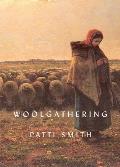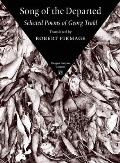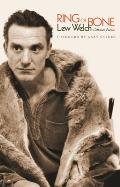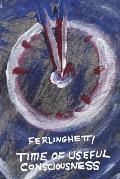It's been a while since I've had the pleasure — or the time — to write for the Powell's blog, so I thought I'd dip my toe into something I really love: a roundup of a few of the best poetry books I've read in the last year. This list, of course, is by no means exhaustive, and I'm sure that every reader will come up with a whole slew of different titles. If you know a book or an author I missed, by all means, let me know — I'll be eternally grateful.
Okay, here we go...
÷ ÷ ÷
 The first book on my list came out at the end of last year and immediately stole my heart. You may know it already, but if you don't, you should definitely, by hook or by crook, pick it up. It is Patti Smith's Woolgathering (New Directions), a slim little volume that flawlessly weaves her melodic, hypnotic voice into a mesmerizing memoir.
The first book on my list came out at the end of last year and immediately stole my heart. You may know it already, but if you don't, you should definitely, by hook or by crook, pick it up. It is Patti Smith's Woolgathering (New Directions), a slim little volume that flawlessly weaves her melodic, hypnotic voice into a mesmerizing memoir.
Originally published as one of the legendary Hanuman Books (a series of tiny little books, mostly written by Beats and their hangers-on, that was inexpensively published in India for an American audience), Woolgathering is here vastly expanded, including both additional text and an exceptional array of photographs that illustrate moments in Smith's early life in a way that is both engaging and transformative. I've read Woolgathering several times; in my experience, one forms a relationship with certain books, and they become an indelible part of what one believes is beautiful and worthwhile in the world. Woolgathering has most certainly achieved that rare plateau with me. If you loved her memoir, Just Kids, this book not only augments that masterpiece but gives it additional depth, resonance, and meaning.
÷ ÷ ÷
 Austrian poet Georg Trakl has long been a favorite of mine, and I was delighted when Copper Canyon Press announced that it was issuing a new selection of his work. Be forewarned, though: Song of the Departed is a dark book. The poems are written in blank verse, and each of them is a miniature, eloquent, fluid masterpiece. One of my all-time-favorite poems is "De Profundis." The first stanza reads:
Austrian poet Georg Trakl has long been a favorite of mine, and I was delighted when Copper Canyon Press announced that it was issuing a new selection of his work. Be forewarned, though: Song of the Departed is a dark book. The poems are written in blank verse, and each of them is a miniature, eloquent, fluid masterpiece. One of my all-time-favorite poems is "De Profundis." The first stanza reads:
It is a stubblefield in which a black rain falls. It is a brown tree, which stands there alone.
It is a hissing wind, which circles empty huts.
How sorrowful this evening.
Obviously, this stuff isn't for everyone. But if you're a fan of the book Maldoror, authors Paul Celan or Antonin Artaud, or many of the classical surrealists, it's a must. While it's not exactly like the work of any of those authors, it explores the same kind of extreme mental landscapes and does so with intoxicating smoothness.
The introduction, by Robert Firmage, is indispensable. It not only spells out the trials and tribulations that shaped the shattered vision of this iconic man of suffering, but gives depth and context and even a margin of understanding to the poetics that underlie the text itself.
Interestingly, during Trakl's brief life, he was one of two poets that the philosopher Wittgenstein chose to anonymously support (the other was Rilke). There's good reason for that, even if you can only read the book in bits. In fact, maybe you should only read it in bits. Linger over it. Let it seep into the dark spaces that you, that all of us, carry within us. The evidence of these 243 German and English facing pages is overwhelming.
÷ ÷ ÷
 I'm a huge fan of Gary Snyder and not merely of his poetry. His essays, in many ways, help shape the way I view my world and the way I fumblingly try to live in it (I'm thinking especially of Earth House Hold). Knowing that, a coworker of mine introduced me to the poems of a friend of Snyder's, Lew Welch. And recently, whether by coincidence or intentionally divine meddling, City Lights Books reissued his one and only book of poems, Ring of Bone.
I'm a huge fan of Gary Snyder and not merely of his poetry. His essays, in many ways, help shape the way I view my world and the way I fumblingly try to live in it (I'm thinking especially of Earth House Hold). Knowing that, a coworker of mine introduced me to the poems of a friend of Snyder's, Lew Welch. And recently, whether by coincidence or intentionally divine meddling, City Lights Books reissued his one and only book of poems, Ring of Bone.
Welch's art is visionary, magical, almost shamanic; I actually don't think that even the word prophetic would be too strong. In many ways, he was head and shoulders above his peers. This stuff is wild, so finely honed that no word, thought, or phrase falls amiss on the page. The poems span the period of 1950 to 1971, the point at which Welch disappeared into the wilderness and is assumed to have committed suicide. Like Snyder, Di Prima, Whalen, and Ginsberg, his work is influenced by Buddhism, but one senses that it's far less serious a commitment for him, far less of a drive than that of his colleagues. To me, his work rings more true when thinking of him as a kind of Taoist sage, sitting on his hilltop, chanting poetry, sipping tea, and laughing at the sky.
Do you want to change your life through the written word? Read the 10-page segment of this book titled "The Hermit Poems," or the legendary untitled, standalone poem on page 87, or anything about the Red Monk and his wondrous mystic engagement with everything that is — you'll be in over your head, and you'll love it.

÷ ÷ ÷
One last thing, and I promise to be brief.
In late October, New Directions (bless their literary hearts) is coming out with Lawrence Ferlinghetti's new book of poems, Time of Useful Consciousness. I've had the honor of reading it in galley form, and I have to tell you, there is both more energy and more erudition on one page of this poetic tramp across America than in any number of books published over the last several years. Believe it or not, Ferlinghetti is 93 years old, and this book veritably hums with youth, vim, and unbridled energy and vision.